7 myths about taking international locum tenens assignments
June 09, 2025
One thing we’ve noticed in surveying and talking to physicians is that myths about international locum tenens abound. Whether it’s worries about the logistics of travel, being away from home for an extended period, or the conditions you’ll be working in, international medical careers aren't as complicated as you may think.
1. Myth: International doctors are either living out of a suitcase, at a hotel, or both
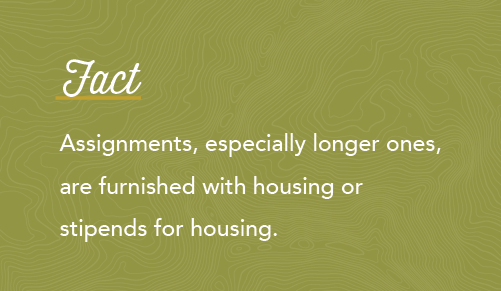
Fact: Assignments, especially longer ones, are furnished with housing or stipends for housing.
While this question probably comes from locum tenens physicians who may have worked shorter-term, closer-to-home assignments in the States, positions abroad are often homier because they last longer. In New Zealand, for example, physicians are provided with housing or sometimes a stipend, which offers the benefit of clients choosing their housing in a convenient and exciting area.
However, housing in other countries isn’t always the same as what we’re used to in the States. Traveling physicians should prepare for differences like smaller home sizes, so families traveling together may need to have the kids share rooms. Sometimes, there will be no heating or air conditioning units, so it’s important to pack accordingly.
Another difference between Kiwi and American homes is the lack of screens on the windows. “Most people just keep their windows and doors open and enjoy the breeze,” says Heather Van Dyk Smith, who spent a year in New Zealand with her husband, Dr. Brian Smith. "But if you’re bothered by insects, you can just buy mesh to put on the windows."
2. Myth: You need to speak the language to practice medicine abroad
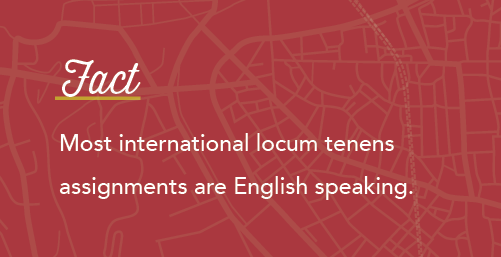
Fact: Most international locum tenens assignments are English-speaking.
You don’t need to feel worried about limiting your travels to English-speaking assignments. If places like New Zealand or Australia aren’t calling to you but Puerto Rico is, you can rest assured that you’ll be understood wherever you go. All facilities where we staff have English-speaking staff, administration, and other physicians. Since English is widely spoken, you will be able to communicate effectively with your colleagues and patients.
3. Myth: Qualifications are too different in other countries
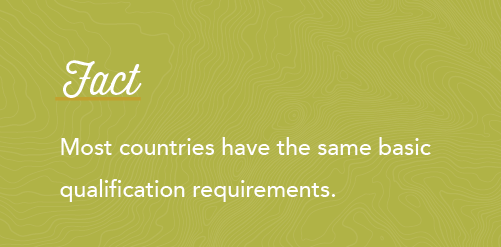
Fact: Most countries have the same basic qualification requirements.
Any trained doctor in good standing from a developed country will most likely qualify to work locum tenens abroad; a few other things help things along. Board certification is a helpful qualification; if you are a fellow at your specialty college, that helps in many instances, too.
Working with a locum tenens agency like ours is a great way to determine if you qualify for work in other countries—just submit your CV and our application. That way, we can see if you are eligible and discuss potential locum tenens opportunities. It’s also helpful if you supply us with notarized copies of your medical diplomas, training certificates, and a certificate of good standing from the body to which you are registered to practice medicine.
4. Myth: It’s too difficult to bring family or a partner along with you
Fact: Family can come along; it’s just all about the visa.
While many physicians attracted to locum tenens are drawn to the independent lifestyle, others have a sense of wanderlust and a family they want to take with them. For those physicians, this myth is just not true. “As far as immigration goes, there’s not much to say other than ‘your family can come,’” says Lindsey Schoenberg, manager of Global Medical Staffing’s international team.
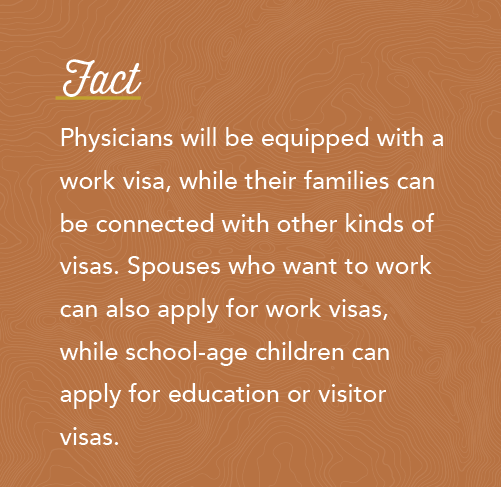
Physicians will be equipped with a work visa, while their families can be connected with other kinds of visas. Spouses who want to work can also apply for work visas, while school-age children can apply for education or visitor visas for older kids.
If there is any complication, while locum physicians’ travel expenses will typically be covered, the same isn’t always true for families who come along. This means planning ahead of time to cover family expenses is vital for taking them with you on your adventure.
If you decide to take kids with you, and they qualify for an education visa, your next question might be how to navigate the school system. Different countries obviously have different school systems, often with different grading systems, schedules, and breaks. However, it’s also very common for physicians to homeschool their children so they’re free to take them along for adventures when they have time off, which is pretty often for locum tenens physicians.
Not all physicians who go to New Zealand as a locums will have school-age children, but those who do will also need to learn about the school system. "My sons went to school while we were there," says Heather, "and the school systems were great."
5. Myth: You can’t take your pet along with you
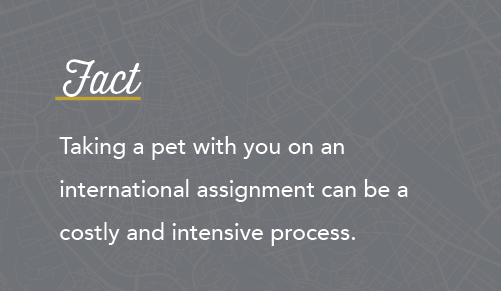
Fact: Taking a pet with you on an international assignment can be a costly and intensive process.
This is one question people have that turns out to be worth the concern. “I strongly encourage leaving your pet home if you can, especially on a six-month assignment,” advises Hailee Hyatt, Global’s international specialties team manager. While it’s one thing to prepare yourself or your family members for a long trip abroad, it’s quite another to prepare a pet. Locations like New Zealand have breed restrictions and other expensive requirements that could put your pet through a lot. “It’s a long flight, pets have to quarantine once they get into the country, and there’s a lot of stuff that they have to do prior, like bloodwork, vet visits, microchipping. So, it’s a costly process.”
If you’re willing to go through the process, it can be done, but it’s also worth considering if your pet would be happy going through all that. Traveling with an animal can also make finding housing harder and more costly, since the housing stipend usually does not cover pets. All said, it may be best to find a trusted friend or relative who can care for pets while you are away.
6. Myth: The application and international paperwork process is so complicated that it isn’t worth it.
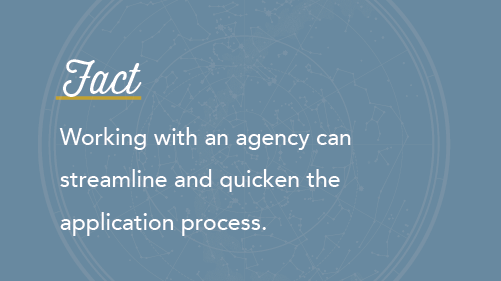
Fact: Working with an agency can streamline the application process and more.
It’s true that these processes are complex, vary from country to country, and take time, sometimes six to nine months. But planning ahead (as in, about a year ahead), and working with an experienced international locums recruiter, can be a matter of checking boxes until it’s finally time to go.
"We can help you find assignments that suit your specialty, skills, and experience, and help start the ball rolling on particular requirements that different countries may have, like New Zealand, which requires references," says Lindsey. Agencies also help physicians get a visa, get their credentials and licenses, and navigate a different country’s medical malpractice standards. They even assist with the on-the-ground stuff, like actually getting there, what kind of transportation you’ll have access to while on assignment, where you’ll live, if you’ll have a stipend, and even how you can bank it.
7. Myth: It’s hard to go exactly where you want for as long as you want
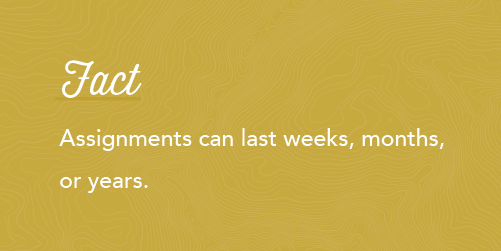
Fact: Assignments can last weeks, months, or years.
Where you can go on an international locum tenens assignment depends on several factors, including your specialty. Different specialties are needed in different places, so your opportunities may vary among locales like Bermuda, Canada, New Zealand, the U.S. Caribbean, and the Pacific Islands.
As for how long you go, you can choose with your recruiter, who can help you find something that suits your timeline. These can be as short as a locum tenens assignment you’d find at home in the States and as long as two years if that’s what you want. “The shortest we’re seeing is from a few weeks to up to 14 weeks in the Virgin Islands,” says Lindsey. “Some assignments average between three and six months, and then we see a lot of six-to-twelve-month timeframes in places like New Zealand or Australia. Some countries like Canada and New Zealand ask for at least a one-year commitment, if not more.”
Check out our listings
“I encourage anyone interested to contact us at Global Medical Staffing, even if you can only go to Guam for three months,” Lindsey says. “You never know what’s going to happen.”
To learn more, give us a call at 800.760.3174 or view today’s international locum tenens job opportunities.

